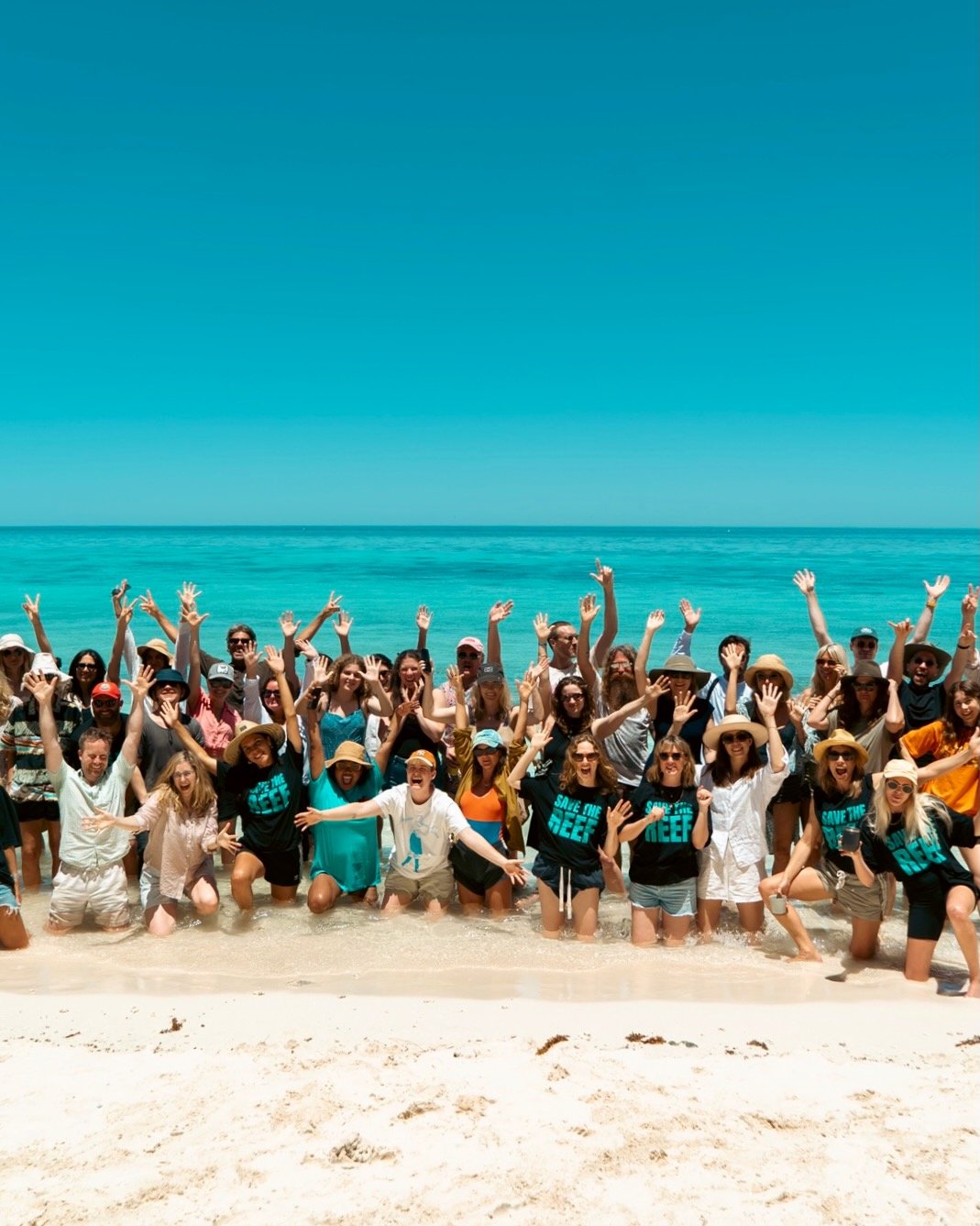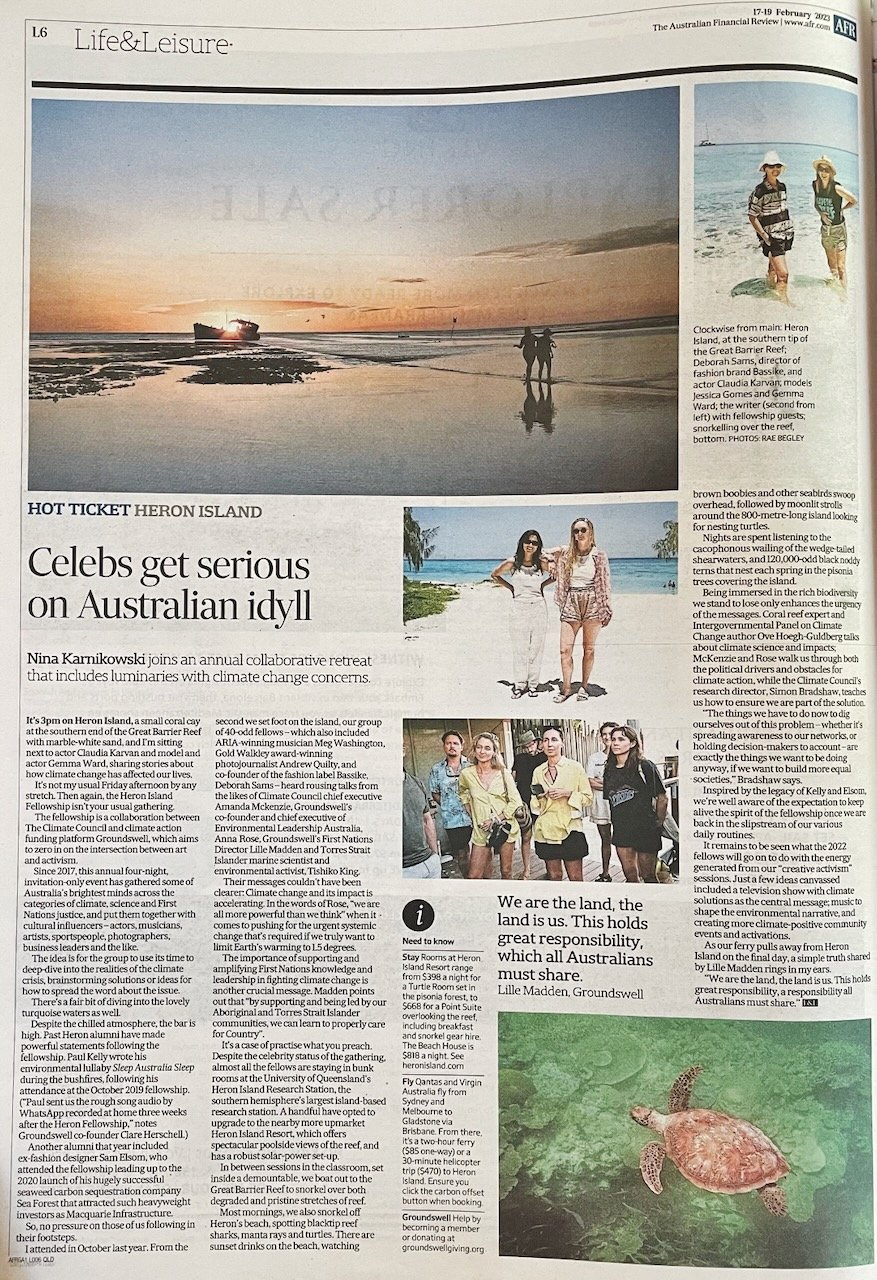HERON ISLAND CLIMATE CHANGE FELLOWSHIP: LIFE + LEISURE
Nina Karnikowski joins an annual collaborative retreat that includes luminaries with climate change concerns.It’s 3pm on Heron Island, a small coral cay at the southern end of the Great Barrier Reef with marble-white sand, and I’m sitting next to actor Claudia Karvan and model and actor Gemma Ward, sharing stories about how climate change has affected our lives.
It’s not my usual Friday afternoon by any stretch. Then again, the Heron Island Fellowship isn’t your usual gathering.
The fellowship is a collaboration between The Climate Council and climate action funding platform Groundswell, which aims to zero in on the intersection between art and activism.
Since 2017, this annual four-night, invitation-only event has gathered some of Australia’s brightest minds across the categories of climate, science and First Nations justice, and put them together with cultural influencers – actors, musicians, artists, sportspeople, photographers, business leaders and the like.
The idea is for the group to use its time to deep-dive into the realities of the climate crisis, brainstorming solutions or ideas for how to spread the word about the issue.
There’s a fair bit of diving into the lovely turquoise waters as well.
Despite the chilled atmosphere, the bar is high. Past Heron alumni have made powerful statements following the fellowship. Paul Kelly wrote his environmental lullaby Sleep Australia Sleep during the bushfires, following his attendance at the October 2019 fellowship. (“Paul sent us the rough song audio by WhatsApp recorded at home three weeks after the Heron Fellowship,” notes Groundswell co-founder Clare Herschell.)
Another alumni that year included ex-fashion designer Sam Elsom, who attended the fellowship leading up to the 2020 launch of his hugely successful seaweed carbon sequestration company Sea Forest that attracted such heavyweight investors as Macquarie Infrastructure.
So, no pressure on those of us following in their footsteps.
I attended in October last year. From the second we set foot on the island, our group of 40-odd fellows – which also included ARIA-winning musician Meg Washington, Gold Walkley award-winning photojournalist Andrew Quilty, and co-founder of the fashion label Bassike, Deborah Sams – heard rousing talks from the likes of Climate Council chief executive Amanda Mckenzie, Groundswell’s co-founder and chief executive of Environmental Leadership Australia, Anna Rose, Groundswell’s First Nations Director Lille Madden and Torres Strait Islander marine scientist and environmental activist, Tishiko King.
Their messages couldn’t have been clearer: Climate change and its impact is accelerating. In the words of Rose, “we are all more powerful than we think” when it comes to pushing for the urgent systemic change that’s required if we truly want to limit Earth’s warming to 1.5 degrees.
The importance of supporting and amplifying First Nations knowledge and leadership in fighting climate change is another crucial message. Madden points out that “by supporting and being led by our Aboriginal and Torres Strait Islander communities, we can learn to properly care for Country”.
It’s a case of practise what you preach. Despite the celebrity status of the gathering, almost all the fellows are staying in bunk rooms at the University of Queensland’s Heron Island Research Station, the southern hemisphere’s largest island-based research station. A handful have opted to upgrade to the more Heron Island Resort, which offers spectacular poolside views of the reef, and has a robust solar-power set-up.
In between sessions in the classroom, set inside a demountable, we boat out to the Great Barrier Reef to snorkel over both degraded and pristine stretches of reef.
Most mornings, we also snorkel off Heron’s beach, spotting blacktip reef sharks, manta rays and turtles. There are sunset drinks on the beach, watching brown boobies and other seabirds swoop overhead, followed by moonlit strolls around the 800 metre-long island looking for nesting turtles.
Nights are spent listening to the cacophonous wailing of the wedge-tailed shearwaters, and 120,000-odd black noddy terns that nest each spring in the pisonia trees covering the island.
Being immersed in the rich biodiversity we stand to lose only enhances the urgency of the messages. Coral reef expert and Intergovernmental Panel on Climate Change author Ove Hoegh-Guldberg talks about climate science and impacts; McKenzie and Rose walk us through both the political drivers and obstacles for climate action, while the Climate Council’s research director, Simon Bradshaw, teaches us how to ensure we are part of the solution.
“The things we have to do now to dig ourselves out of this problem – whether it’s spreading awareness to our networks, or holding decision-makers to account – are exactly the things we want to be doing anyway, if we want to build more equal societies,” Bradshaw says.
Inspired by the legacy of Kelly and Elsom, we’re well aware of the expectation to keep alive the spirit of the fellowship once we are back in the slipstream of our various daily routines.
It remains to be seen what the 2022 fellows will go on to do with the energy generated from our “creative activism” sessions. Just a few ideas canvassed included a television show with climate solutions as the central message; music to shape the environmental narrative, and creating more climate-positive community events and activations.
As our ferry pulls away from Heron Island on the final day, a simple truth shared by Lille Madden rings in my ears.
“We are the land, the land is us. This holds great responsibility, a responsibility all Australians must share.”
You can help by becoming a member or making a one-off donation at groundswellgiving.org
This story first appeared in print below, and online here.

